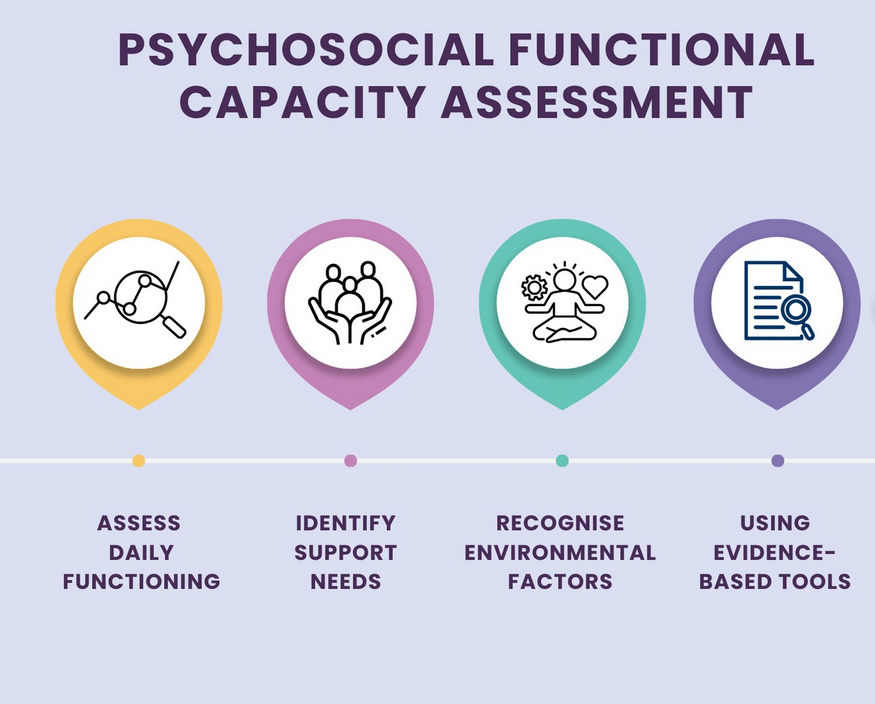
What Is a Psychological or Psychosocial Functional Capacity Assessment?
A psychosocial FCA is a structured evaluation of how a person’s mental health condition or psychosocial disability impacts their ability to perform daily activities. Unlike generic assessments, it focuses on functional capacity—what someone can do independently, where they need support, and what barriers exist in their environment. For example:
- Can they cook meals, manage finances, or use public transport?
- How do symptoms like social anxiety or low motivation affect their ability to work or study?
- What supports would help them build independence and resilience?
These assessments are critical for NDIS eligibility and planning. They provide evidence of how a person’s disability substantially reduces their functional capacity in areas like communication, social interaction, self-care, and self-management
.
The Assessment Process: A Closer Look
A quality psychosocial FCA is thorough, collaborative, and evidence-based. Here’s what it typically involves:
1. Comprehensive Interviews and History-Taking
Assessors gather detailed information about the individual’s mental health history, daily routines, and challenges. This might include conversations with the participant, family members, support workers, or healthcare providers
.
2. Standardized Assessment Tools
Professionals use validated tools like:
- WHODAS (World Health Organization Disability Assessment Schedule): Measures functioning across six domains, including mobility and social participation.
- Life Skills Profile (LSP-16): Evaluates practical skills like self-care and community engagement.
- Health of the Nation Outcome Scale (HONOS): Tracks mental health symptoms and their impact on daily life
These tools provide objective data to support NDIS applications and funding requests.
3. Environmental and Social Considerations
A hallmark of psychosocial FCAs is their focus on systemic barriers. Assessors examine factors like housing instability, stigma, or lack of social support that exacerbate disability
. For instance, someone experiencing homelessness may struggle with self-care not solely due to their condition but because of unstable living conditions.
4. Strengths-Based Approach
The assessment identifies not just challenges but also strengths—such as resilience, creativity, or existing coping strategies—that can be leveraged in support plans
.
5. Collaborative Reporting
The final report outlines actionable recommendations, such as:
- NDIS-funded supports (e.g., recovery coaching, occupational therapy).
- Environmental modifications (e.g., assistive technology for task management).
- Goals aligned with the participant’s aspirations, like returning to work or rebuilding social connections
Why Are These Assessments So Important?
1. Access to Tailored NDIS Supports
Without a robust FCA, individuals risk being denied NDIS access or receiving generic supports that don’t address their unique needs. For example:
- A participant with severe social anxiety might receive funding for a psychosocial recovery coach to build confidence in public settings
Someone with fluctuating symptoms due to bipolar disorder could gain access to flexible support workers who adapt to their changing needs
- .
2. Early Intervention and Prevention
Psychosocial disabilities often involve episodic symptoms. A well-timed assessment can identify early warning signs and connect participants to supports that prevent crises. For instance, therapy focused on emotion regulation might reduce hospitalizations for someone with borderline personality disorder
.3. Empowerment Through Clarity
Many participants describe the assessment process as validating. By clearly linking their symptoms to functional challenges (e.g., “My depression makes it hard to shower regularly”), they gain language to advocate for themselves in healthcare and community settings
.
4. Addressing Complex and Intersecting Needs
Psychosocial disabilities rarely exist in isolation. A trauma survivor might also face substance abuse or chronic pain. FCAs help untangle these layers, ensuring supports address the root causes of disability rather than just symptoms
.
5. Economic and Social Participation
By identifying barriers to work or education, assessments can unlock supports like:
- Job coaching for someone with social anxiety.
- Cognitive remediation therapy to improve focus and organizational skills
The Role of Skilled Assessors
Not all assessments are equal. The quality hinges on the expertise of the assessor—often a social worker, occupational therapist, or psychologist specializing in psychosocial disabilities. Key traits of effective assessors include:
- Cultural Competence: Understanding how cultural background influences symptom expression and help-seeking behavior
Trauma-Informed Practice: Recognizing the impact of past trauma on current functioning and avoiding re-traumatization during assessments
Flexibility: Meeting participants where they are, whether in a clinic, shelter, or via telehealth
For example, a social worker might adjust their approach for a participant with paranoia by conducting shorter, more frequent sessions to build trust gradually
.
Navigating the NDIS with Assessment Insights
Once an FCA is complete, the real work begins. NDIS plans informed by these assessments often include:
Capacity-Building Supports
- Social Skills Training: Group sessions to practice communication or conflict resolution.
- Daily Living Supports: Assistance with cooking, budgeting, or personal care during periods of low motivation
Therapeutic Interventions
- Occupational Therapy: Strategies to manage sensory overload or develop routines.
- Cognitive Behavioral Therapy (CBT): Tools to challenge negative thought patterns affecting daily function
Broader Impacts: Beyond the Individual
Quality psychosocial FCAs don’t just transform individual lives—they drive systemic change. By highlighting gaps in community services (e.g., lack of affordable housing for people with mental illness), these assessments inform policy and funding decisions. They also reduce long-term healthcare costs by preventing hospital readmissions and fostering independence
.
Conclusion: A Pathway to Dignity and Inclusion
Psychosocial functional capacity assessments are more than a bureaucratic requirement; they are a bridge to a life of dignity, choice, and connection. For NDIS participants, a thorough assessment can mean the difference between surviving and thriving. By illuminating both challenges and strengths, these evaluations ensure supports are not just about managing disability but about unlocking potential.
If you or someone you know is struggling with a psychosocial disability, reaching out for an assessment could be the first step toward reclaiming control. With the right supports in place, every individual has the capacity to build a meaningful, self-directed life.




